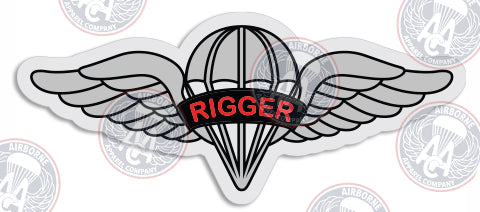The U.S. Army Parachute Riggers are the Soldiers who pack, maintain, and repair every parachute used by America’s airborne forces. Trained at Fort Benning and Fort Lee, riggers uphold the motto “I Will Be Sure Always,” symbolizing their commitment to airborne safety and trust. Every paratrooper who steps from an aircraft relies on the expertise of Army Riggers to bring them safely to the ground. Airborne Apparel Company is proud to offer reproductions and unique designs that celebrate the legacy of the U.S. Army Riggers.
Origins and Early History
The roots of the U.S. Army Parachute Riggers stretch back to World War II, when airborne units were first formed and the need for specialists to pack and maintain parachutes became critical. In 1942, the Army formalized the rigger role, establishing training programs to ensure that parachutes were packed by qualified personnel rather than general Soldiers. From that moment on, riggers carried the responsibility of every paratrooper’s life in their hands.
Training and Qualification
Today, rigger training begins at Fort Benning, Georgia, where Soldiers complete Airborne School and earn their Parachutist Badge. From there, candidates attend the Quartermaster School’s Parachute Rigger Course at Fort Lee, Virginia (now reverting to its historic name after a brief renaming). The intensive course covers parachute packing, air item rigging, aerial delivery of supplies, and repair techniques. Graduates earn the distinctive Parachute Rigger Badge—a set of wings with a parachute and star—marking them as trusted professionals within the airborne community.
The rigger motto, “I Will Be Sure Always,” captures the essence of the role: absolute precision and accountability. To emphasize this trust, rigger tradition dictates that each Soldier must jump with a parachute they have personally packed.
Mission and Role
Army Riggers are responsible for:
-
Personnel parachutes – packing and maintaining the T-11 and other airborne systems.
-
Cargo parachutes – preparing aerial delivery systems for vehicles, artillery, ammunition, and supplies.
-
Maintenance and repair – inspecting, repairing, and certifying parachutes and related equipment.
-
Aerial resupply – supporting airborne and special operations units worldwide with precision airdrops.
Riggers serve across the airborne force, supporting the 82nd Airborne Division, 173rd Airborne Brigade, Special Forces Groups, and other rapid-deployment units. Their skills are also critical in humanitarian missions, where cargo parachutes deliver aid to remote or disaster-stricken regions.
Legacy and Recognition
The legacy of the rigger corps is one of quiet professionalism. While paratroopers and airborne infantry often take the spotlight, riggers work behind the scenes ensuring every jump is possible. Their training pipeline is among the Army’s most demanding technical specialties, requiring meticulous attention to detail and unwavering reliability.
Through every era—from World War II combat drops in Sicily and Normandy to the modern T-11 jumps in Iraq and Afghanistan—Army Riggers have been indispensable. Their reputation is such that airborne Soldiers trust their lives to them without question.
Airborne Apparel Company is proud to offer reproductions and unique designs that celebrate the legacy of the U.S. Army Riggers.




